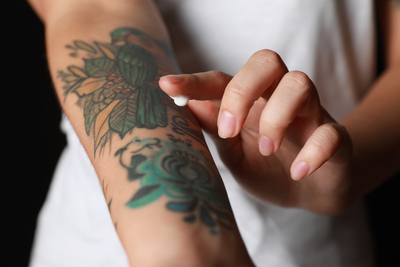Inked: Caring for Tattooed Skin
 Whether a tiny sketch on an ankle or a detailed arm cuff or bodysuit, tattoos require care. Adding simple steps to your daily skincare routine can go a long way to ensuring your tats age well ‚ÄĒ and your skin remains healthy. ‚ÄúAs long as tattooed skin is monitored appropriately, tattoos are perfectly safe,‚ÄĚ says Dr. Michele Farber, board-certified dermatologist at Schweiger Dermatology Group in Philadelphia.
Whether a tiny sketch on an ankle or a detailed arm cuff or bodysuit, tattoos require care. Adding simple steps to your daily skincare routine can go a long way to ensuring your tats age well ‚ÄĒ and your skin remains healthy. ‚ÄúAs long as tattooed skin is monitored appropriately, tattoos are perfectly safe,‚ÄĚ says Dr. Michele Farber, board-certified dermatologist at Schweiger Dermatology Group in Philadelphia.
If you‚Äôre considering getting a tattoo ‚ÄĒ or adding to your portfolio ‚ÄĒ learn about the most favorable areas of the body for tattoos; complications that can occur; skin cancer safety; and optimizing the health and beauty of your skin.
Operating Manual
Inked skin ages just as we do. “You should plan to care for this tattoo for as long as you want it to look nice,” Dr. Jeremy Fenton, board-certified dermatologist at Schweiger Dermatology Group in New York, told Bustle in an article about tattoos. “The most important thing you should do is protect it from the sun.‚ÄĚ He advises using a broad-spectrum sunscreen with a SPF 30 or higher to protect against UV damage and prevent dulling or blurring of the imagery.
The following tips are baseline requirements when caring for inked skin:
- Moisturize regularly with a gentle, fragrance-free moisturizer.
- Hydrate to maintain skin elasticity and keep tattoos dynamic.
- Exfoliate if needed, but only use a gentle, mild scrub to remove dead skin cells.
- Avoid excessive sun exposure, smoking and other skin-damaging habits.
Staying Safe
In addition to always covering tattoos on exposed areas with sunscreen, Dr. Farber emphasizes the importance of screening for skin cancer in areas of a tattoo. ‚ÄúFirst, it is important to have a baseline skin exam to make sure there are no concerning lesions in the area of a planned tattoo,‚ÄĚ she says. ‚ÄúIt is also best to ask your tattoo artist to avoid covering moles with tattoo ink so that these can be monitored for changes.‚ÄĚ
She recommends her patients examine tattoos once a month at home and look for new raised bumps or scaly, irritated areas that do not heal. ‚ÄúIf you notice changes, please seek care with your dermatologist,‚ÄĚ she adds. ‚ÄúAnd, if you‚Äôve had skin cancer, it‚Äôs important to avoid tattooing over a scar from removal, particularly if it was a melanoma, as it‚Äôs crucial to be able to monitor for recurrence or pigment changes over the scar of a melanoma excision.‚ÄĚ
Be on Alert
Other complications can occur. Dr Farber notes, ‚ÄúInfections can happen with tattoos, although this risk should be low if tattoos are done in a clean, reputable place with sterile needles.‚ÄĚ That said, some areas of the body are more prone to infection.
The belly button, mouth, under the breasts, near the butt or groin area harbor moisture and bacteria. Hands encounter germs often while high friction areas can get agitated. No matter where your tattoo is, keep the area clean, dry and unrestricted. And if you suffer from any chronic skin conditions, like eczema or psoriasis, consult with your dermatology provider before getting a tattoo as the process can negatively impact these conditions.
Watch for Reactions
Once your tat has healed, you should be aware that other complications can pop up. Dr. Farber warns, ‚ÄúIt‚Äôs possible to get tattoo reactions like keloids, granulomatous or allergic reactions.‚ÄĚ She explains, ‚ÄúKeloids may happen due to the trauma of needling particularly in those prone to scarring.‚ÄĚ
Granulomatous or allergic reactions can appear because of a reaction to tattoo ink. New York Yankees left fielder Alex Verdugo spent three years battling itchy, blistering, scabbing hands. Through testing, an allergist recently diagnosed him with contact dermatitis caused by chromate and cobalt, two metals used when making his leather batting gloves.
Verdugo‚Äôs chest and arm tattoos may have triggered his hand allergy since the pigments contain cobalt and nickel, says Dr. Susanna Silverman, a board-certified allergist and immunologist at Schweiger Dermatology Group. ‚ÄúIt‚Äôs possible Verdugo became sensitized to the materials used in his tattoos, which may have included metals.‚ÄĚ She adds, ‚ÄúRepeated exposure to a material, such as a metal, can sometimes lead to sensitization, so the immune system overreacts to the material on future exposures.‚ÄĚ Dr. Farber adds, ‚ÄúIf your tattoo is red, itchy, bumpy or painful, see your dermatologist to evaluate.‚ÄĚ
Change of Heart: Tattoo Removal
As passionate as you were about getting tattooed, there may come a day when you want to explore removal options. “Tattoo ‚Äėremoval‚Äô isn‚Äôt really full removal,” Dr. Fenton told Bustle. “Although we have many powerful lasers to fade and remove tattoos, the skin will never be the same. Going through the tattoo removal process often leaves behind some ink and can possibly cause scarring.”
Laser tattoo removal takes about 12 sessions. High-intensity laser beams are passed in short pulses to the second layer of skin where the pigment resides. The laser beam is absorbed by the colors in the tattoo (without impacting the skin) to break down the ink into smaller cells. The ink is then broken down over time by the white blood cells within your body and flushed out of your system through the liver.
Another reason not to smoke: Your tattoo will be even more difficult to remove. And the hardest colors to eliminate are blue and yellow. Since black ink absorbs all laser wavelengths, it is the easiest to break down. Healing can take four to eight weeks.
Tattoo Care at Schweiger Dermatology Group
Long-term tattoo care is about maintaining both your tattoo’s appearance and your overall skin health. Our providers can discuss tattoo care, help create a customized skincare routine and address any issues that may occur.
To make an appointment, call or text (844) DERM-DOC / (844) 337-6362 or book your appointment online.
